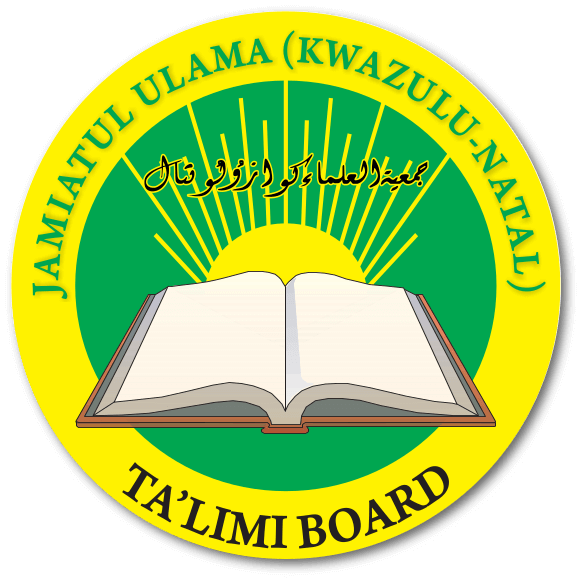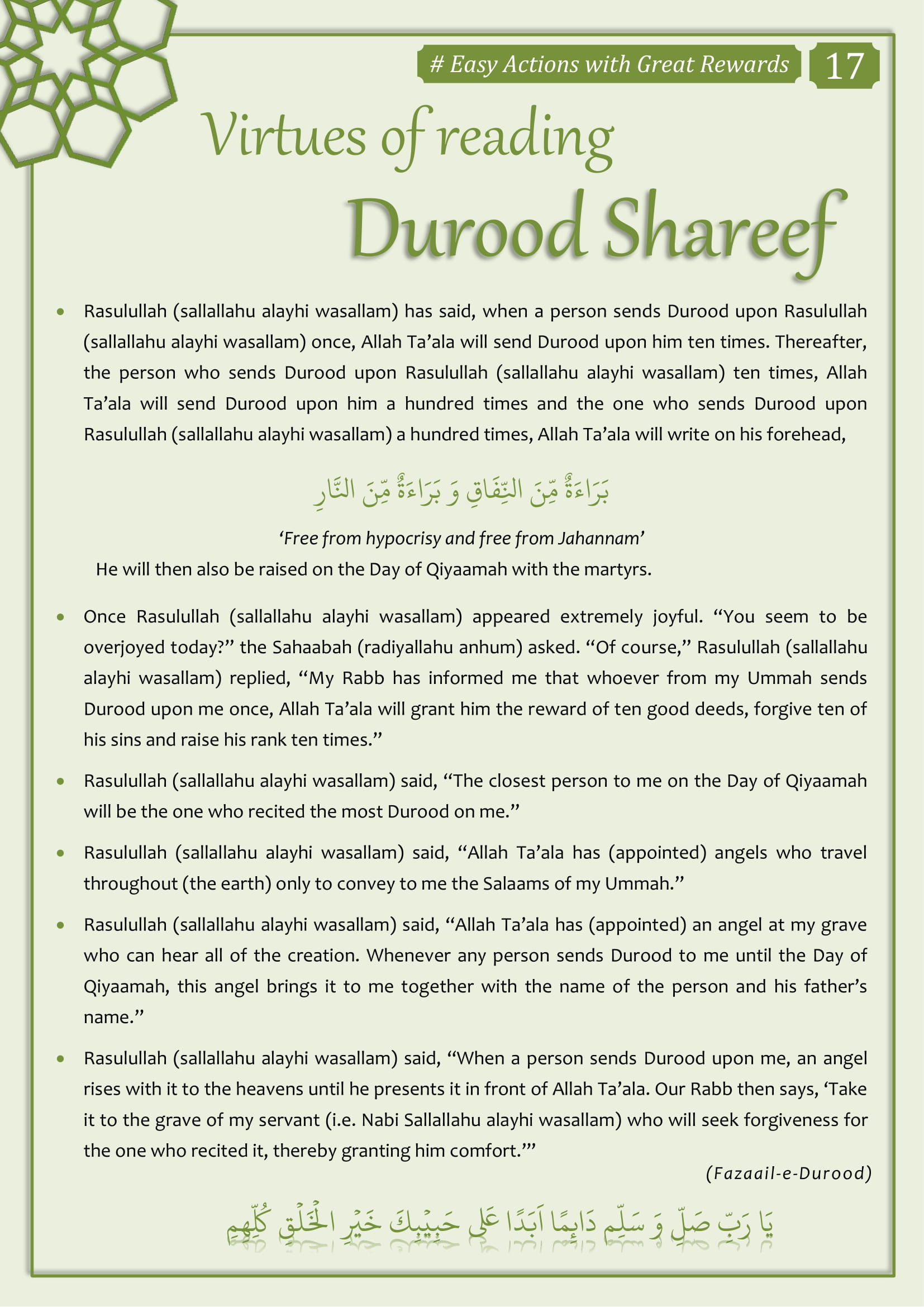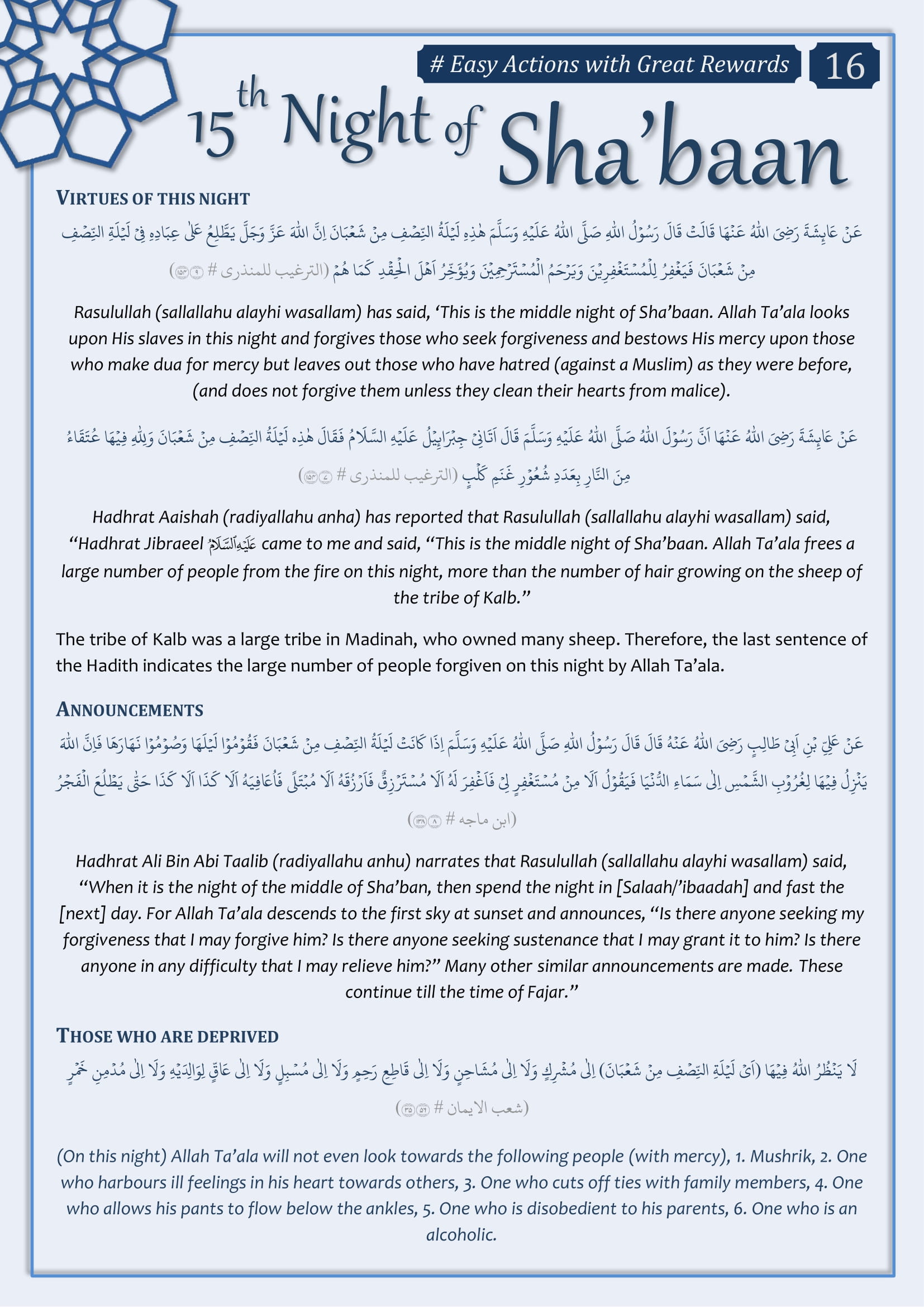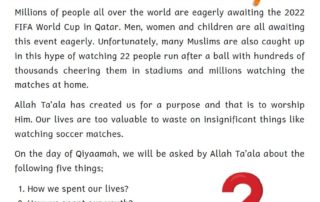Hadhrat ABU AL-DARDA Radiyallahu Anhu
Hadhrat ABU AL-DARDA Radiyallahu Anhu
Uwaymir bin Malik Al-Khazrajee radiyallahu anhu, famously known as Abu Darda, was the last person from his locality to accept Islam. From the moment he accepted Islam, he was filled with remorse for delaying in accepting the truth and therefore he made every effort to catch up in learning, practicing and propagating the beautiful Deen of Islam just like all the other noble companions of Rasulullah sallallahu alayhi wasallam.
He immersed himself so much in the ibaadat of Allah Ta’ala that he felt business was an impediment in him acquiring the knowledge of Deen. He gave up business and dedicated himself entirely to the service of Islam. Someone once asked him the reason for this to which he responded, “Before accepting Islam, I was a merchant. After accepting Islam, I decided to combine business and worship, but I was unable to fulfil my duties as I would’ve liked. Therefore I left business and focussed on Ibaadat. By the one in who’s hands lies the soul of Abu Darda, I would not wish to have a shop by the door of the masjid where I could earn 300 Dinars daily if it meant me missing a single salaah!” He then turned to the questioner and said, “I’m not saying that Allah Ta’ala has prohibited trade, rather I long to be of those who are not distracted by buying and selling from the remembrance of Allah Ta’ala.” This is the effect of Imaan permeating deep into the recesses of the heart.
Hadhrat Abu Darda radiyallahu anhu did not only leave out trade; he renounced the world and its temptations completely. One bitterly cold night, he entertained some visitors with a simple meal. However, he did not provide them with any form of warm covering. One of them mustered up the courage and entered his room, after seeking permission, only to find that Abu Darda radiyallahu anhu and his wife only had a thin cloth to cover themselves which offered no protection against the cold. The man exclaimed to Abu Darda radiyallahu anhu, “I see that you are planning to spend the night in the same condition as us. Where on earth are your belongings?” Abu Darda radiyallahu anhu calmly replied, “We have another home where we send all the profits and gains as soon as we earn them. Had we kept any belongings in this house, we would have given them to you. There is a long difficult journey ahead towards that home, one who has a little load will be better off than the one who’s load is heavy. Therefore we wish to have an easy journey across. Do you understand?” he replied, “Yes I understand and may Allah Ta’ala recompense you with good.”
On one occasion, a youngster went to him seeking advice. Abu Darda radiyallahu anhu said to him, “O my beloved son, remember Allah in prosperity, He will remember you in adversity. O my beloved son, be a scholar, a teacher or an attentive listener and do not be from the ignorant ones, for you will perish. O my beloved son, let the Masjid be your home, for I have heard Rasulullah sallallahu alayhi wasallam say, “The masaajid is the abode for every Allah-fearing man.” Allah has guaranteed mercy and tranquility for those whose homes are the masaajid and the crossing of the siraat (bridge) becomes easy.”
When Abu Darda radiyallahu anhu lay on his deathbed, his companions entered and asked him, “What do you lament?” He replied, “My sins.” They asked, “What do you hope for?” He replied, “The forgiveness of my Rabb.”
Thereafter he continued reciting the Kalimah until he passed away.
عن معاذ بن جبل، قال: قال رسول الله -صلى الله عليه وسلم-: “من كان آخر كلامه لا إله إلا الله دخل الجنة”
Rasulullah sallallahu alayhi wasallam said, “The one whose last words are لا إله إلا الله will enter Jannah.”
(Source: Stories from the lives of the Sahabah-Suwarum min hayyatis Sahaabah)
Guidelines for Madrasah Jalsahs
The purpose and object of a jalsahh is to;
- Please Allah Ta’ala
- Motivate the pupils by allowing them to participate and giving them prizes for outstanding achievements.
- Pass on some message of Deen to the parents and others who will be attending the madrasah jalsah.
Below are a few guidelines for those having Jalsahhs
- Jalsahhs should not resemble school concerts and fashion shows. Don’t be extravagant in preparing for the jalsahh. No money must be spent on stage decor, props, costumes and other wasteful aspects. The jalsahh is a platform to give a message of Deen. By wasting money on these items a totally wrong message will be given.
- Jalsah preparations should not impact on Madrasah times. Jalsah preparations should take place on Friday afternoons for 15 minutes and children should be called on Saturday mornings to prepare for the jalsah. Besides these two times, no other madrasah times must be used for jalsah prep.
- Nazams must not have back ground music and resemble the tunes and lyrics of English and Hindi songs. The meanings of the naaths should be checked by some learned aalim that it does not contain any words of shirk or kufr, etc.
- Dialogues maybe prepared which have a good message. No plays and dramas to take place in the jalsah.
- Be very careful about intermingling of sexes. [preferably have a mothers only jalsah]
- Baaligh boys should not be made to participate in the jalsah. They may participate in a jalsah that is especially for fathers.
- Prizes given to pupils should be motivating and educational. Carefully select the prizes for the pupils.
- Pupils should not be made to go out and collect funds for the jalsahs.
NB: The jalsah is not a concert or something to entertain the pupils and parents. A few days before the jalsah get all the children to also join the asaatizah to make dua that the jalsah should be a means of hidaayat for all.
Hadhrat Sa’d bin Muaaz Al-Ansaari radiyallahu anhu
Hadhrat Sa’d bin Muaaz Al-Ansaari radiyallahu anhu is amongst the many stalwarts of Islam, who sacrificed their time, youth, wealth and life for Rasulullah sallallahu alayhi wasallam and his noble cause. He hailed from the famous city, Yathrib (Madinah Munawwarah) and was a man of great dignity and honour. He was the leader of the Aws tribe and was well known for his courage, bravery, hospitality and self-sacrifice.
Prior to the coming of Rasulullah sallallahu alayhi wasallam, the Arabs in Madinah Munawwarah like the Makkans worshipped idols and made Sajdah (prostrated) before them. They would carve idols with their own hands and then believed them to be their gods. Centuries had passed in this way and they remained steeped in idol worship. The people of Yathrib (Madinah Munawwarah) heard that a prophet has appeared in Makkah and is propagating a new religion. They were shocked to hear this news. “What new religion is this?” they asked each other.
After some time, Rasulullah sallallahu alayhi wasallam sent a young Sahaabi to Madinah by the name of Mus’ab bin Umair radiyallahu anhu. He stayed at the home of As’ad bin Zurarah radiyallahu anhu. Here, he began the work of da’wat and tableegh, inviting people towards Islam. People were attracted to his talks and were wonderstruck by his beautiful recitation of the Qur-aan Shareef. “This is not the words of any man” they exclaimed. Once, a young leader of the Ansaar, Usaid bin Hudair, heard the sermon of Musab bin Umair radiyallahu anhu. He was so affected by the beautiful recitation of the Qur-aan Shareef that he immediately accepted Islam. Upon accepting Islam, he felt it is his obligation to invite others into Islam as well. His eyes were set on his close friend Sa’d bin Muaaz. “If S’ad embraces Islam” he said, “every member of the Aws tribe will accept Islam.”
Usaid bin Hudhair radiyallahu anhu set out to meet his friend Sa’d and related to him all that he had heard from Musab bin Umair radiyallahu anhu. “Why don’t you go and listen to his talks? I did not find anything objectionable in his words” said Usaid. When Sa’d heard this news, he flew into a rage. Wielding his sword, he set out towards the home of As’ad bin Zurarah radiyallahu anhu (the host of Hadhrat Mus’ab radiyallahu anhu). As he reached As’ad’s home S’ad shouted, “If it were not that you are related to me, I would have finished you off with this sword. Have you brought this man here to deceive our people?”
On seeing Sa’d’s fury, Mus’ab radiyallahu anhu retorted, “S’ad! Is it possible for you to sit down and listen to me for a few moments? If you like what you hear you may accept it otherwise you are free to do as you please.” “Okay,” replied S’ad, “That is rather fair.” Saying this, he sat down. Mus‘ab radiyallahu anhu presented the truth of Islam before him and he recited a few verses of the Qur-aan Shareef to him. He barely heard the verses of the Qur-aan Shareef when the colour of his face changed. He immediately pleaded to Musab radiyallahu anhu, “How do I enter into this religion?” Mus‘ab radiyallahu anhu replied: “Firstly, you should cleanse your clothing and take a bath. Recite the Kalimah Shahaadah and perform two Rakaats of Salaah.” Without any delay, S’ad got up, took a bath, recited the Kalimah Shahaadah and performed two Rakaats of Salaah. He now, headed towards his people. As they saw him coming from a distance, they realized that something had happened. There was something different about him. When he reached their gathering, S’ad radiyallahu anhu addressed them saying: “What do you people think of me?” In one voice they all shouted: “You are our leader. As far as your discretion and advice is concerned, you are the best amongst us.” S’ad radiyallahu anhu said: “By Allah! I will never speak to any of you until everyone of you believes in Allah Ta’ala and His Rasool sallallahu alayhi wasallam.” Before nightfall, not a single man or woman of the Banu ‘Abdul-Ashal tribe were left without embracing Islam. This incident was the most memorable event in spreading Islam. There is no Sahaabi that is equal to Sa’d bin Muaaz radiyallahu anhu in this virtue.
After accepting Islam, there was nothing more beloved to Sa’d radiyallahu anhu than Allah Ta’ala and His Rasool sallallahu alayhi wasallam. Islam became so beloved to him that even if his best friends spoke ill of Nabi sallallahu alayhi wasallam he was prepared to wage war against them.
Umayyah bin Khalaf,[1] the cruel master of Hadhrat Bilal radiyallahu anhu was a close friend of Sa’d bin Muaaz radiyallahu anhu. When Umayyah would travel to Syria on business, he would stay over in Madinah Munawwarah at the residence of S’ad bin Mu’aaz radiyallahu anhu and when S’ad radiyallahu anhu would come to Makkah Mukarramah, he would stay over at Umayyah’s house. On one occasion, after the Hijrah of Rasulullah sallallahu alayhi wasallam, S’ad bin Mu’aaz radiyallahu anhu decided to perform Umrah. He came to Makkah Mukarramah and as was his previous arrangement, stayed over at Umayyah’s place. As he settled down, S’ad bin Mu’aaz radiyallahu anhu requested Umayyah to take him to the Haram Shareef for Tawaaf at a time when the Haram Shareef was quiet. Umayyah took S’ad radiyallahu anhu to the Haram Shareef during the early afternoon. Whilst he was making Tawaaf, Abu Jahal appeared before them demanding: “O Abu Safwaan! (This was the title of Umayyah) Who is this person with you?” “This is S’ad,” replied Umayyah. Abu Jahal snapped: “I see that he is performing Tawaaf with such ease and comfort. Why do you provide assistance and refuge to such irreligious people?” Addressing S’ad bin Mu’aaz radiyallahu anhu, Abu Jahal warned: “S’ad! I swear by Allah, that if Abu Safwaan (Umayyah) was not with you, you would not have returned safely from here.” S’ad radiyallahu anhu retorted: “If you prevent me from performing Tawaaf, by Allah, I will ensure that your access to Syria through Madinah is stopped.” When Umayyah heard this he said to S’ad radiyallahu anhu: “Do not raise your voice before Abul Hakam (Abu Jahal). He is the chief of this valley.” Furiously, S’ad radiyallahu anhu turned to Umayyah and retorted: “Umayyah! Let it be. I have heard Rasulullah sallallahu alayhi wasallam predicting that you would be slain at the hands of his companions.” Umayyah began shivering with fright. He anxiously asked: “Will I be killed in Makkah?” S’ad I replied: “I have no idea of the exact location where you will be put to death but this is what Rasulullah sallallahu alayhi wasallam said about you.” On hearing this, Umayyah was flung into an overwhelming state of panic and anxiety. He hastened to his wife Umm-e-Safwaan and narrated the entire incident to her. Since that day Umayyah was always uneasy and restless. Every moment he feared death. Eventually, he was killed in Badr by the Sahaabah of Rasulullah sallallahu alayhi wasallam.
Hadhrat Sa’d bin Muaaz radiyallahu anhu spent his entire life in the service of Rasulullah sallallahu alayhi wasallam. At every occasion he showed his allegiance to Islam and stood up for the protection of Deen. On the occasion of Badr he stood out amongst others and showed his deep love for Rasuluallah sallallahu alayhi wasallam. The Sahaabah (radiyallahu anhum) were not prepared for battle when they left Madinah Munawwarah. They had come out to attack the caravan of Abu Sufyaan which was passing Madinah. One or two days into the journey, Rasulullah sallallahu alayhi wasallam was informed about the departure of the Quraysh from Makkah and requested the Sahaabah (radiyallahu anhum) to prepare for imminent battle. The Sahaabah (radiyallahu anhum) were not ready for battle. Some of them were initially hesitant (because they did not leave home with the intention of engaging in hostilities). Rasulullah sallallahu alayhi wasallam was very concerned. He called up a mashwarah with the Sahaabah radiyallahu anhum and addressed them saying, “O people! What is your opinion in this regard? Give me your Mashwarah.”
On this occasion Hadhrat S’ad bin Mu’aaz radiyallahu anhu promptly understood what Rasulullah sallallahu alayhi wasallam meant. He instantly submitted: “O Rasulullah sallallahu alayhi wasallam! Perhaps your speech is directed to the Ansaar?” Rasulullah sallallahu alayhi wasallam replied in the affirmative. Upon this, Hadhrat S’ad bin Mu’aaz radiyallahu anhu passionately declared:
“O Rasulullah sallallahu alayhi wasallam! We affirmed our Imaan in you, we believe in you, we bear testimony to the fact that whatever you came with is the truth and upon this we had wholeheartedly pledged our absolute submission. O Rasulullah sallallahu alayhi wasallam! Perhaps you emerged from Madinah with a specific purpose but Allah Ta’ala has brought about something else. Proceed as you deem fit. You may maintain ties with whom you wish and you may sever ties with whomsoever you wish. You may enter into a peace agreement with whom you wish and you may engage in battle with whom you wish. We are with you all the way. You may take from our wealth whatever you please and you may bestow upon us whatever you please. Whatever you take from our wealth would be dearer to us than what you would leave behind, and whatever you command us to do, we will unquestionably abide by it. If you instruct us to set off for Barkul-Ghamaad with you, we will eagerly accompany you. I swear by the Being Who has sent you with the truth, if you instruct us to leap into the ocean we would eagerly hurl ourselves into it and none of us would be left behind. We do not detest confronting the enemy. Yes, during the heat of battle we are tolerant and we are committed to meet the enemy head-on. We hope Allah Ta’ala will give us the ability to do something that would bring about the coolness of your eyes. So, in the name of Allah, take us along with you.”
Nabi sallallahu alayhi wasallam was most pleased on hearing the speech of Sa’d bin Muaaz radiyallahu anhu. Upon setting the army in their positions, Nabi sallallahu alayhi wasallam handed the flag of the Aws to Hadhrat S’ad bin Muaaz radiyallahu anhu. During the preparations for the Battle of Badr, Hadhrat S’ad bin Mu’aaz radiyallahu anhu stood guard at the door of the hut of Rasulullah sallallahu alayhi wasallam, wielding his sword. He spent the entire night outside the hut guarding Rasulullah sallallahu alayhi wasallam.
There is another incident mentioned in the books of History that shows the big heartedness of Hadhrat Sad bin Muaaz radiyallahu anhu and the Ansaar of Madinah. When the spoils of war arrived from the Banu Nadheer, Rasulullah sallallahu alayhi wasallam decided to distribute the entire share to the Muhaajireen. The reason for this was that the Ansaar were looking after all the needs of the Muhajireen. Rasulullah sallallahu alayhi wasallam wanted to lessen the burden of the Ansaar and make the Muahjireen independent from the Ansaar. The Ansaar, due to their sincerity and selflessness, did not regard this as a burden but rather as a source of coolness to their eyes. Nonetheless, Rasulullah sallallahu alayhi wasallam summoned the Ansaar and formally addressed them. In this address, after praising Allah Ta’ala, he paid tribute to the sacrifices of the Ansaar and their good conduct to their fellow brethren, the Muhaajireen. He then said: “O people of the Ansaar! If you wish, I am prepared to distribute the wealth of the Banu Nadheer equally between you and the Muhaajireen and they will continue sharing your wealth as they did in the past or if you wish, I will distribute it solely amongst the Muhaajireen. They will then leave your homes and sustain themselves.” S’ad bin ‘Ubaadah radiyallahu anhu and S’ad bin Mu’aaz radiyallahu anhu, the leaders of the Ansaar immediately submitted: “O Rasulullah sallallahu alayhi wasallam! We would be delighted if you distribute this wealth amongst the Muhaajireen only. They are still at liberty to live in our homes and partake of our meals as they did in the past.”
In the battle of Khandaq, he was struck on his neck with an arrow and as the blood gushed from his wound, he made the following dua:
“O Allah! If this battle with the Quraysh is bound to last (for some time) then allow me to live as I have no yearning greater than to fight those who put Your Messenger through such hardship, falsified him and evicted him from the Haram Shareef. O Allah! If this is the end of the war, make this injury a source of my martyrdom and do not take my life until I am able to cool my eyes with the humiliation of the Banu Qurayzah [2].”
Nabi sallallahu alayhi wasallam had barely removed his armour after the battle of Khandaq, when Hadhrat Jibraaeel alayis salaam commanded him to head towards the Banu Quraizah. The Aws Tribe were allies of the Banu Qurayzah. They pleaded with Rasulullah sallallahu alayhi wasallam, “O Rasulullah sallallahu alayhi wasallam! Just as you dealt with the people of Banu Nadheer on the request of their allies, the Khazraj, we the Aws, implore you to deal with our allies, the Banu Qurayzah in a like manner.” Rasulullah sallallahu alayhi wasallam replied: “Would you not be pleased if a man from amongst yourselves makes a decision in this regard?” “Surely,” they replied, “We would be pleased with the decision made by S’ad bin Mu’aaz radiyallahu anhu.” When Hadhrat S’ad bin Mu’aaz radiyallahu anhu was wounded in the battle of Khandaq (the trench), Rasulullah sallallahu alayhi wasallam erected a tent for him in the Masjid so that he could visit him often. Rasulullah sallallahu alayhi wasallam sent someone to fetch him. He mounted a donkey. As he drew closer, Rasulullah sallallahu alayhi wasallam said to the Aws tribe: “Stand up in honour of your leader.” When he dismounted, Rasulullah sallallahu alayhi wasallam said: “with regard to the Banu Qurayzah, these people have consigned the decision-making over to you.” S’ad bin Mu’aaz radiyallahu anhu replied: “My decision is as follows: “Their combatants i.e. their men should be executed and their women and children should be taken as slaves. Furthermore, all their wealth and possessions should be distributed amongst the Muslims.” To this, Rasulullah sallallahu alayhi wasallam remarked: “Certainly you have passed judgement according to the divine commandment of Allah Ta’ala.”
Thereafter, Hadhrat S’ad radiyallahu anhu made the following dua:
“O Allah! You are well aware that nothing is dearer to me than waging Jihaad against the people who falsified Your Messenger and banished him from the Haram. O Allah! It appears to me that You have now terminated war between us and them. If we are still destined to go to war with the Quraysh, allow me to live and wage Jihaad against them in Your path and if You have decreed to end jihaad against them, then cause this wound to gush forth and make it a source of my martyrdom.”
After this incident Sa’d radiyallahu anhu lived for just a few days. Nabi sallallahu alayhi wasallam himself had treated his wound in order to stop the bleeding. One day this wound began to ooze. The blood flowed with such force that from the Masjid it reached the Banu Ghifaar tribe. The Sahaabah radiyallahu anhum were extremely worried on being told that the wound of S’ad radiyallahu anhu burst open. Nabi sallallahu alayhi wasallam was also informed. He hurried to the Masjid. upon reaching the Masjid, He found that S’ad radiyallahu anhu had passed away. Nabi sallallahu alayhi wasallam placed S’ad radiyallahu anhu on his lap with the blood still flowing from his wound. People gathered around him. From the tent, the wailing of his respected mother was heard. When Nabi sallallahu alayhi wasallam heard this he said, “Every lady that laments is a liar except for the mother of S’ad radiyallahu anhu”
When his Janazah departed, Nabi sallallahu alayhi wasallam said, “In this Janaazah 70 000 angels have joined in. “When his janaazah was raised, the hypocrites ridiculed him, saying, “This Janaazah is so light.” (The hypocrites were not pleased with his decision regarding the Banu Quraizah.) Nabi sallallahu alayhi wasallam retorted, “The lightness of his janaazah is due to the fact that the angels in large number are carrying his janaazah.” After the burial, Nabi sallallahu alayhi wasallam returned extremely grieved. His Mubaarak face was in his hands and tears were continuously flowing from his mubaarak eyes. The death of Hadhrat S’ad bin Muaaz radiyallahu anhu was a great loss for the Muslims. The services he had rendered to Islam had given him the title of “The Siddiq-e-Akbar of the Ansaar.”
Hadhrat Jaabir radiyallahu anhu narrates that he heard Rasulullah sallallahu alayhi wasallam saying: “The throne of Allah Ta’ala shuddered at the death of S’ad bin Mu’aaz.” According to another narration, “All the doors of Jannah were opened for him, and the angels of the skies were delighted with the ascension of his soul”.
An Ansaari composed the following piece of poetry on this occassion:
وَمَا اهْتَزَّ عَرْشُ اللّٰهِ مِنْ مَوْتِ هَالِكٍ سَمِعْنَا بِهِ اِلَّا لِسَعْدٍ اَبِيْ عَمْرٍو
“We have not heard of the throne of Allah shudder upon the death of anyone, except for the death of Abu ‘Amr S’ad bin Mu’aaz.”
His grave would emit the fragrance of musk and Allah Ta’ala knows best. He was laid to rest in Jannatul Baqee, the graveyard of Madinah Munawwarah. Upto this day the grave of Sa’d bin Muaaz radiyallahu anhu is marked in Jannatul Baqee.
Once, somebody sent a silken cloth to Nabi sallallahu alayhi wasallam. The Sahaabah radiyallahu anhum were surprised at it’s softness. Nabi sallallahu alayhi wasallam said, “You are impressed by it’s softness, In Jannat, the cloth of S’ad radiyallahu anhu is softer than this.”
These are the noble Sahaabah (radiyallahu anhum), the companions of Rasulaullah sallallahu alayhi wasallam who sacrificed everything they had, including their lives for Allah Ta’ala, Rasulaullah sallallahu alayhi wasallam and His noble Deen. As Muslims, we should love and respect every Sahaabi and try our best to emulate them. May Allah Ta’ala grant us the taufeeq (ability) to be like them.
[1] Umayyah bin Kahalaf was an arch enemy of Islam. He was the person responsible for persecuting Hadhrat Bilal I when he accepted islam.
[2] The Banu Qurayzah was a Jewish tribe who were allies of the Aws. They caused untold difficulties and hardships to Rasulullah sallallahu alayhi wasallam.
Examination Guidelines for Teachers
Bismihi Ta’ala
Most Respected Mu’allim/ah
Please take note of the following guidelines that will insha Allah assist you in the forthcoming exam;
- Study the syllabus breakdown carefully and complete your syllabus well before the examination date.
- Draw up a revision program in all subjects for the pupils so that all necessary work can be revised thoroughly.
- Give the breakdown to each child in writing and explain to them how to revise their work.
- Contact the parents of the children in your class and ask them to assist in the revision program.
- Have the names of the pupils written down in alphabetical order in the mark sheet on both sides prior to the exams.
- Encourage the baaligh girls as well as those who are close to buloogh to wear purdah and attend madrasah, especially for the examination. (Better to have screen and the girls can sit behind the screen when the exams are taken).
- Those girls who are in their menses should be indicated with a star (*) on the mark sheet. They should not be embarrassed in front of the entire class. They will be tested in Duas and Hadith.
- Ensure that all pupils are present at the Madrasah at least 10 minutes before the examination commences.
- Write the exam dates on the board so that children are aware and are prepared for the examinations.
- Conduct a mock exam by asking your principal or co-teacher to examine your class and point out any weak areas.
- Have the Blue Progress Cards for each pupil filled in and ready for the examiner. Please erase all past years comments and symbols.
- Please make dua for the children in your class as well as for the entire Ummah.
- After the examinations the marks must be entered into the Mark Schedules. Please triple check to see that all additions, totals, percentages and averages are correctly calculated. The class Mu’allim/ahs is responsible for correct calculations. This form must be filled in and sent to the office for record keeping.





